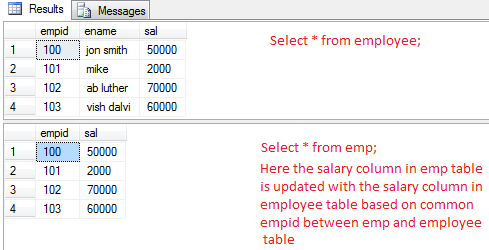IF-THEN-ELSE statement. For example, you can use CASE in a WHERE clause. CASE is used to provide if-then-else type of logic to SQL.
Because of this pairing, you might be tempted to call this SQL CASE WHEN, but CASE is the accepted term. Every CASE statement must end with the END statement. So, once a condition is true, it will stop reading and return the result. The SQL CASE statement.
If no conditions are true, it returns the value in the ELSE clause. Evaluates a list of conditions and returns one of multiple possible result expressions. Ask Question Asked years, months ago.

Syntax of CASE Expression SQL CASE expression is used as a type of IF - THEN - ELSE statement. You can use the CASE statement within a SQL statement. ELSE block in CASE statement holds the sequence that needs to be executed when none of the alternatives got selected. To keep the changes, save the script.
Keyboard shortcut: hold Ctrl and press B then U to uppercase all keywords in a script, or highlight a keyword to uppercase only that one. Followed by the selector is any number of the WHEN clauses. If the selector value is equal to expression in the WHEN clause, the corresponding sequence of statement after the THEN keyword is executed. Note that if you want to add the if-else logic to an SQL statement, you use the CASE expression which is different from the CASE statement described in this tutorial. If the ELSE clause is omitte the system substitutes a default action.
SQL Tutorial will guide us now IN SQL keyword , there are two uses of the SQL IN keyword , and this SQL Tutorial section introduces the one that is related to the SQL WHERE clause. When used in this context, we know exactly the value of the returned values we want to see for at least one of the columns. We’re relying on our parser to correctly identify the keywords here, so the words will change AS the parser recognizes them. This means they might not change right way, but rather as the SQL statement you’re working on gets closer to completion.
EXISTS is a Boolean operator used in a subquery to test whether the inner query returns any row. If it does, then the outer query proceeds. If not, the outer query does not execute, and the entire SQL statement returns nothing. They are case -insensitive.
Notice the statement is finished with the END CASE keywords rather than just the END keyword. Syntax: SELECT UNIQUE column column…. Hi There, Need help, why it keep prompting me saying below statement has missing keyword ? I know about the setting in Intellsense where it automatically uppercases all functions, but what about all the other keywords ? Therefore your two choices are :-1.
Write an extended stored-procedure 2. In that case you need to build a small program. SQL Server uses reserved words for database operations. SQL , Structured Query Language , is a programming language designed to manage data stored in relational databases. SQL operates through simple, declarative statements.
This keeps data accurate and secure, and it helps maintain the integrity of databases, regardless of size. Here’s an appendix of commonly used commands. SQL -procedure-statement Specifies a statement that follows the THEN and ELSE keyword. Oracle SQL allows you to add Boolean logic and branching using the decode and CASE clauses.
In this example, I will only two columns and will demonstrate to you how you can write a dynamic SQL like query based on if the condition has value or not. It is common practice to make a column case insensitive to ensure that you return all of the desired rows. Case cannot return sql to be processed. By far the most common use of the keywor CONTAINS requires two arguments and returns a number a result presenting true or false.
It will be (true) if it finds a match and (false) if it doesn’t. Certain keywords, such as SELECT, DELETE, or BIGINT, are reserved and require special treatment for use as identifiers such as table and column names. Keywords are words that have significance in SQL.
This may also be true for the names of built-in functions.
Geen opmerkingen:
Een reactie posten
Opmerking: Alleen leden van deze blog kunnen een reactie posten.